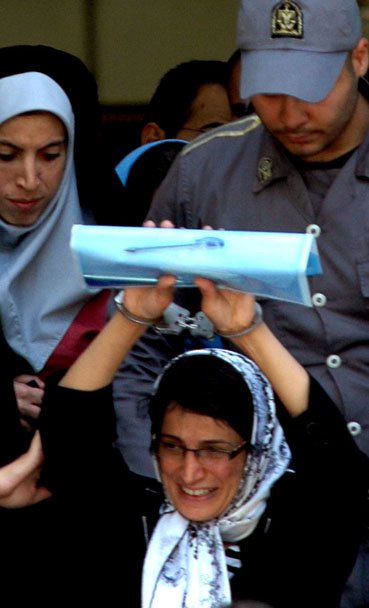 Shirin Ebadi --- Nobel Prize winner and co-founder of Iran's Center for Defenders of Human Rights, now living in exile --- writes in The Guardian:
Shirin Ebadi --- Nobel Prize winner and co-founder of Iran's Center for Defenders of Human Rights, now living in exile --- writes in The Guardian:
Not so long ago, my colleague Nasrin Sotoudeh was the lawyer so many of us human rights defenders in Iran would call when our government harassed us or put one of us, or one of our family members, in jail. Sadly it is now Nasrin who is in jail. The government's accusations against her include acting contrary to "national security", "propaganda against the state", and "membership" of the Center for Defenders of Human Rights, an organisation I founded in 2001. The government has also accused her of failing to wear hijab, the traditional Islamic covering for women. On some of these trumped-up charges she has been sentenced to 1 1 years in jail, and is now banned from practising law for 20 years.
This courageous 45-year-old mother of two young children is one of many in Iran who are targeted --– and punished – for speaking up for the rights of others. Women are all too frequently on the receiving end of the Iranian regime's wrath –-- as we know from the case of Sakineh Mohammadi Ashtiani, sentenced to be stoned to death for allegedly committing adultery. But what makes Nasrin's case especially poignant is that it raises a fundamental question about Iran's future. If the people who come to the defence of people whose human rights are violated cannot do their jobs, who will ensure that such values as equality and justice are upheld in Iran?
Iranian authorities arrested Nasrin at Tehran's notorious Evin prison last September, during a visit to a client who is a political prisoner. Since then Nasrin has spent most of her time in solitary confinement. To protest against her illegal arrest, Nasrin has gone on several hunger strikes. Iranian officials have denied her access to a lawyer, and for the first month she was not allowed to talk to her family, even on the phone. At one point authorities detained her husband for speaking publicly about his wife's case.
Why is the Iranian government so afraid of Nasrin Sotoudeh? It is clearly frustrated that an Iranian woman's work is shining a light on the deplorable human rights situation in Iran. Nasrin is fearless in taking on cases that other lawyers carefully avoid, and for that she has earned respect around the globe. She took on the case of Zahra Bahrami, a Dutch-Iranian who was arrested for participating in post-election demonstrations in 2009. Zahra was denied her right to an appeal and, despite the intervention of Dutch authorities and a call by the European Union not to go ahead, she was executed without warning on 29 January.
Nasrin was my lawyer in a complaint I filed against Kayhan, a conservative newspaper, and she also defended me when Iranian authorities seized my assets in 2009. Nasrin has also taken on cases involving juvenile executions – Iran is one of the few countries in the world that still puts children to death. Nasrin's case, among others, is making Iran's failure to uphold basic human rights increasingly obvious. This is why some countries are pushing for a United Nations human rights council resolution on Iran, with a special rapporteur to carry out investigations into human rights abuses there. Such a push is encouraging, but it will still take a few more countries to reach a majority within the council.
Before her arrest the authorities summoned Nasrin to the tax office and froze her assets. While she was there she realised that the government was carrying out similar "investigations" of at least 30 other lawyers. If Iran is jailing its human rights defenders we need to step up efforts to ensure that justice is upheld there. Such concrete international action would be, in my mind, the best way to honour my colleague Nasrin.
Posted via email from lissping
No comments:
Post a Comment
Note: only a member of this blog may post a comment.